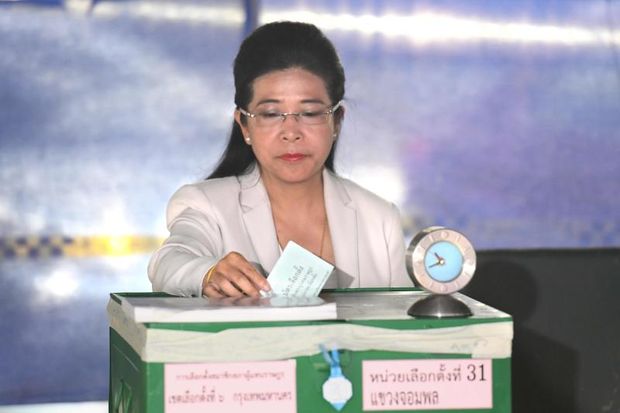
An exit poll in Thailand's first election since a 2014 coup indicated the ousted Pheu Thai Party of exiled former premier Thaksin Shinawatra won the most seats at 163, while the military proxy party came second at 96 seats.
But unofficial results direct from the Election Commission (EC) gave Pheu Thai fewer votes, with Palang Pracharat winning a surprising number of seats in the former Pheu Thai stronghold of northern Thailand.
An EC briefing on the vote count was postponed from 8pm to 8.30pm, with a further delay possible.
Either projection would mean that Pheu Thai would lack sufficient votes to form a majority government in its hoped-for "democratic front" with other parties. The "pro-democracy" parties would need a combined 376 seats in the 500-member House to form a government if all 250 junta-appointed senators, as expected, support Palang Pracharat (PPRP) and the other parties that favour the military. Bhumjaithai -- which has so far exceeded expectations -- is seen likely to join any winning coalition, while Chart Thai Pattana and Chart Pattana could follow suit. The Democrat Party has ruled out forming a coalition with Pheu Thai and leader Abhisit Vejjajiva said he would not support Gen Prayut as prime minister. But he also promised to quit if his party wins less than 100 seats -- and that's almost certainly the case. Under new leadership, the party might be willing to support Gen Prayut as PM.
There are early signs, then, that a PPRP-Democrat-Bhumjaithai coalition could take power.
The pro-army Palang Pracharat party that wants to keep junta leader Prayut Chan-o-cha as prime minister also would need coalition partners, but it would have a better chance due to junta-written electoral rules that favour it. The exit poll was conducted by Thai research centre Super Poll and televised on local channel Thai PBS immediately after voting closed at 5pm.
Thai PBS predicted the Democrat party would come a distant third with 77 seats, trailed by Bhumjaithai with 59 and Future Forward with 40. Future Forward's tally was made up entirely of party list seats determined by proportional representation; it was not expected to win any constituency seats.
A Suan Dusit poll of nearly 80,000 voters forecast Pheu Thai to win 173 seats in the 500-member parliament, compared with 96 -- the same number as Super Poll predicted -- for the military-backed Palang Pracharat party.
An initial exit poll from Nation TV, however, put Palang Pracharat in first place at 135-140 seats. It was followed by the Thaksin-linked Pheu Thai party at 120-135 seats. Last week the channel aired a fake video purporting to show a conversation between Future Forward leader Thanathorn Juangroongruangkit and fugitive ex-prime minister Thaksin Shinawatra.
A Bangkok Poll survey taken during the month prior to the election but released after polls closed on Sunday showed PPRP and Pheu Thai received a similar proportion of votes -- 25% -- followed by the Future Forward and Democrat parties.
In the preference for prime minister, current Prime Minister Prayut Chan-o-cha, who represented PPRP, had a substantial lead over Khunying Sudarat Keyuraphan of Pheu Thai: 28.7% to 20.6%.
-- Developing story --
Election analysis video from Thai PBS: